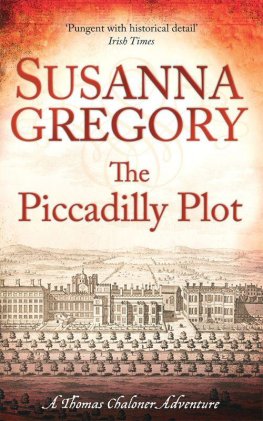Susanna Gregory
A MASTERLY MURDER
2000

Cambridge, January 1349
A SILVER MOON SLANTED ITS BRIGHTNESS INTO THE muddy streets of the Fen-edge town. The clear weather had brought a biting cold, so that even huddled inside his thick warm cloak, Master Wilson of Michaelhouse shivered, and his fingers and toes were so chilled that he could barely feel them. There was a dusting of frost over the rutted filth of the High Street, and the numerous potholes were glazed with a crust of ice, cunningly concealing the slushy mess of raw sewage and rubbish that waited to ooze around carelessly placed feet.
Usually, so late in the evening, the town would be still, the silence broken only by the occasional bark of a dog or the footsteps of the night-watch as they patrolled the town. But, that January, England was in the grip of a terrible disease that had rolled relentlessly across Europe, killing old and young, rich and poor, and the good citizens with the bad. The agonised gasps of the dying and the wails of the bereaved shattered the peace, and in many houses lights burned in the chambers where the sick lay.
Wilson shuddered and drew his cloak more closely around him, stepping quickly over the huddled form of a beggar who lay in the street. Whether the man was merely sleeping or whether he had succumbed to the plague, Wilson could not tell and was not inclined to find out. He hurried on, leaving the High Street to make his way towards the Barnwell Causeway and St Radegunds Priory, where his lover awaited him.
A shriek of despair from the house of Sheriff Tulyet made his blood run cold. So far, the numerous Tulyet clan had been fortunate, and not one of them had been affected by the foul sickness that turned healthy people to blackened, stinking corpses within a few hours or days, if they were unlucky. But the pestilence was showing no signs of weakening its grip on the town, and Wilson suspected it had been only a matter of time before the Sheriffs family lost someone to it. He slipped quickly into the shadows when he saw two people emerging from Tulyets house. He recognised them as his Michaelhouse colleagues Matthew Bartholomew and Brother Michael, one a physician and the other a Benedictine monk. Physicians were all but useless against the plague, and people gained far more comfort from the ministrations of the clerics, who were at least able to grant them absolution before they died. Wilson was sure that Brother Michael had been a greater solace to the Tulyets than Bartholomew and his ineffective remedies could ever hope to be.
He pressed himself back into the blackness of a doorway as the two scholars walked past. By day, Wilson kept to his room, seeing no one and running the College by yelling through the firmly closed door. No one knew how the plague spread, but Wilson had heard that people who hid themselves away from the victims were more likely to escape infection than those who walked freely among them. Wilson did not want Bartholomew and Michael to speak to him: even meeting their eyes might be enough to give him the disease. He also did not want them to know that he left his room each night to meet with the lovely Prioress of St Radegunds Convent. Living in isolation was all very well during the day, when his business was with the rough assortment of men who were Michaelhouses scholars and servants, but once night fell, and darkness enveloped the town, Wilson longed for the warmth of human contact and found he needed the companionship and understanding that only the Prioress could provide.
When the trudging, exhausted footsteps of Bartholomew and Michael had faded away and he was alone again, Wilson left his hiding place and continued along Bridge Street. From a house in front of him came a sudden shaft of golden light as a door was flung open. There was no time to duck into the shadows before Adela Tangmer, the vintners daughter, dashed out and saw him. Before he could stop her, she had seized his arm, her ugly, horsy face white with shock and grief.
Please help me. My mother is dying and she needs a priest.
Wilson tugged his arm away quickly and took several steps back, trying to distance himself from her. I am sorry, but I cannot help you. I am not a friar.
But as a scholar of the University you have taken holy orders and can therefore grant absolution to the dying. My father told me that you absolved Mayor Horwoodes wife only last night. Please! My mother does not have many moments left to her.
I am sorry, said Wilson, trying to edge around her without coming too close. But Mistress Horwoodes was a special case.
My mothers is a special case, pleaded Adela. She once committed adultery, and she needs to confess before she dies or she will spend eternity in Purgatory. Only you can help her.
No, said Wilson firmly, starting to walk away. I am in a hurry.
I will pay you any amount you ask, called Adela desperately, as he began to stride up the street.
Abruptly, Wilson stopped and turned to face her, shaking his head in disbelief. Do you think I would risk my life for money? It would not be much use to me if I were to catch the contagion and die.
I have a pomander filled with special spices that you can place over your nose and mouth, said Adela immediately. And I will lend you my charm it has been dipped in the holy well at Walsingham and if you wear it, you will be quite safe.
Wilson hesitated, so Adela quickly unfastened a healthily heavy purse from her belt and handed it to him. He weighed it in his hand, and then nodded reluctant agreement. He passed from the cracking cold of the January night into the mellow warmth of the house, and then followed Adela into the fearsome hell of a plague victims death chamber.
Late September 1353
The autumn sun drenched the fields of ripe corn and barley near the river in a haze of scarlet and gold. Beyond the dusty yellow of the crops were the water meadows, great swaths of marshy grass lined with trees that were tinged amber and orange as their summer foliage began to turn. Across the river were the towers and the thatched and tiled roofs of the Universitys Colleges Michaelhouse, Trinity Hall, Gonville, Peterhouse and Clare.
The sounds of a fine day were in the air. The exuberant shrieks of children who played in the rivers murky shallows mingled with the bleat of grazing sheep and the distant jangle of bells announcing the office of terce. The air was rich with the scent of freshly mown hay, the crops that still awaited harvesting, and the ever-present sulphurous odour of the River Cam. A lark twittered in the pale blue sky high above, while nearer to the ground, a pair of pigeons cooed contentedly in the ancient oak trees that stood sentinel near the old mill.
Two men strolled along the winding path that ran past the mill and then on to the little village of Newnham Croft beyond. One wore the distinctive blue tabard that marked him as a Fellow of Benet College, while the other wore the grey habit of a Franciscan friar. They walked slowly, enjoying the peace of a Sunday afternoon away from their various duties and obligations.
What has been happening at Benet this week? asked the friar, leaning down to pick a grass stem on which to chew. Does it still seethe with arguments and plots?
Of course, said the scholar. And work on the new accommodation range progresses so slowly that I wonder whether we will be long in our graves before it is completed. If I had known I would be living in an unfinished building for three years, I am not sure I would have accepted a Fellowship at Benet.
The friar smiled. It was not a pleasant smile, and there was more malice than friendship in it. I heard a story about one of your Benet colleagues the other day. He sold several bracelets to Harold of Haslingfield, the goldsmith.




